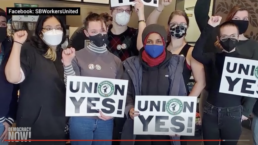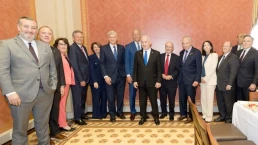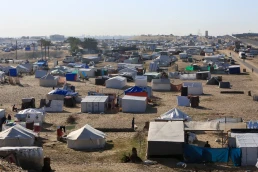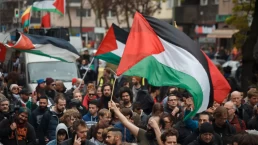Starbucks Workers United has now successfully unionized over a dozen Starbucks shops, and about 200 stores have filed for union elections, covering 5,000 workers in 30 states.
By Jaz Brisack & Amy Goodman, Democracy Now!
We speak with Starbucks Workers United organizer and barista Jaz Brisack on the growing Starbucks union drive that has swept across 30 U.S. states since she helped successfully organize the first U.S. unionized location in Buffalo, New York, last December. Starbucks Workers United has now successfully unionized over a dozen Starbucks shops, and about 200 stores have filed for union elections, covering 5,000 workers in 30 states. This all comes despite an aggressive union-busting campaign from the Starbucks Corporation that includes firing pro-union workers and forcing employees to attend anti-union meetings — a practice the National Labor Relations Board’s general counsel has argued is illegal under federal law. Meanwhile, the NLRB says it’s planning to formally accuse Starbucks of illegally firing a group of seven employees who were fighting to unionize their Starbucks store in Memphis, Tennessee. Brisack also talks about Amazon’s first union in Staten Island, New York, saying the move “shows we as workers and as the labor movement can take on 15 baristas in a tiny Starbucks or 8,000 workers in an Amazon warehouse as long as we are standing together.”

AMY GOODMAN: This is Democracy Now! I’m Amy Goodman, with Juan González, as we turn to get an update on the growing union efforts led by Starbucks workers across the country. The historic movement began when a single Starbucks store in Buffalo, New York, voted to unionize in December. Now 200 stores have filed for union elections, covering over 5,000 workers in at least 30 states. Starbucks Workers United has successfully unionized over a dozen Starbucks shops, including in New York, Arizona, Washington, Tennessee, Missouri. And on Monday, workers at two stores in Boston and Brookline, Massachusetts, unanimously voted to unionize. Just last week, workers at the high-end Starbucks Reserve Roastery in the Chelsea neighborhood of Manhattan voted to become the first Starbucks to unionize in New York City. It’s one of the largest Starbucks in the world.
This all comes despite an aggressive union-busting campaign from the Starbucks Corporation that includes firing pro-union workers in retaliation and forcing workers to attend anti-union meetings. The National Labor Relations Board has called on a ban on this practice, arguing it’s illegal under federal law. Meanwhile, the NLRB says it’s planning to formally accuse Starbucks of illegally firing a group of seven workers who were fighting to unionize their Starbucks store in Memphis, Tennessee. Last Monday, Starbucks billionaire CEP Howard Schultz spoke out against the unionization drive during a town hall meeting with about 15,000 employees.
HOWARD SCHULTZ: Now, here’s where it gets a little sensitive, because I’ve been coached a little bit, but I do want to talk about something pretty serious. We can’t ignore what is happening in the country as it relates to companies throughout the country being assaulted, in many ways, by the threat of unionization.
AMY GOODMAN: For more, we’re joined by Jaz Brisack, barista at the Starbucks store in Buffalo, New York, that was the first location in the U.S. to unionize, with Starbucks Workers United.
Welcome back to Democracy Now!, Jaz. Talk about this — I mean, you guys started it in Buffalo. Now 200 stores in more than 30 states. Talk about your strategy, and respond to Schultz.
JAZ BRISACK: Thanks so much for having me, first.
It’s been incredible to see this turn into this kind of national movement. I mean, we’ve had support from the beginning from partners across the country. And the first store to file after Buffalo was actually a Mesa, Arizona, store, whose manager was retaliated against for telling us exactly what all of these people coming into Buffalo were actually up to. And when Starbucks retaliated against her and fired her, before she had the chance to finish her time at Starbucks after resigning, they were the first store to petition, outside of Buffalo. But from there, it’s been incredible. I feel like it’s almost — I’m not even able to keep up with how many more stores have been launching. So it’s incredible to see so many folks. And the first store in the South won a few weeks ago in Knoxville, which was really incredible. The Memphis folks are still — not only did Starbucks fire six out of the seven-person organizing committee, but they also have still delayed that vote from actually being scheduled with the labor board. But it’s incredible to see more people joining and this movement growing. And I think we all know that that’s how we’re actually going to get the kind of contract that we can sign and that partners deserve, is by continuing to get stronger and show that, despite everything, we keep overcoming that union busting and standing together in solidarity.
And, I mean, I think it’s ridiculous that Howard Schultz is, first, this threatened by unions, because we’ve said, from day one, you know, we’re not doing this because we’re opposed to Starbucks; we’re doing this because we want to make Starbucks the best that it can be and the most sustainable that it can be. It says it’s a progressive company that celebrates all of these other forms of activism — LGBT rights, environment justice, Black Lives Matter — and then suddenly it’s being assaulted by labor rights. So, that doesn’t make sense. That’s not consistent with what Starbucks says it is. But I think, you know, we’ve seen Howard come to Buffalo and make really inappropriate comparisons to the Holocaust, and now we’re seeing him say that he’s being assaulted. So, I think he tries to acknowledge that it’s a sensitive subject, but he’s still really missing the mark on how to talk about it.
JUAN GONZÁLEZ: And, Jaz, what’s your reaction to the news that Amazon workers at the Staten Island warehouse at the start of this month voted to form the country’s first Amazon union?
JAZ BRISACK: Absolutely ecstatic. That was the same day as the roastery win, which was really an amazing thing to have both of those coming together. And I think it shows, you know, we can — we as workers and as the labor movement can take on 15 baristas in a tiny Starbucks or 8,000 workers in an Amazon warehouse as long as we are standing together.
AMY GOODMAN: And finally, the retaliation against workers? We just have 30 seconds, Jaz.
JAZ BRISACK: I mean, I think it’s been almost a scorched-earth strategy. Not only has Starbucks been firing vocal union leaders, like the Memphis Seven, like Laila in Arizona, like Cassie Fleischer and others in Buffalo, but they’ve been slashing hours across the country to try to purge everyone and force everyone to quit or have to get other jobs, and then telling them, “Oh, suddenly your availability doesn’t meet the needs of the business.” If we — the only — this is all showing —
AMY GOODMAN: Five seconds.
JAZ BRISACK: Sorry. This is all showing just how much we need a union, because, you know, together we can fight back against all of these things.
AMY GOODMAN: Jaz Brisack, we want to thank you for being with us, barista at the Starbucks store in Buffalo, New York, the first location in the U.S. to unionize with Starbucks Workers United.
And that does it for our show. A very happy birthday to Anna Ozbek, María Inés Taracena, Mary Conlon and David Prude! We have a job opening for a news writer/producer. Check democracynow.org. I’m Amy Goodman. Thanks so much for joining us.
The original content of this program is licensed under a Creative Commons Attribution-Noncommercial-No Derivative Works 3.0 United States License.
Recent Posts
Why Are Democratic Lawmakers Still Meeting With Netanyahu?
July 12, 2025
Take Action Now Pictures show Democrats like Chuck Schumer standing next to Netanyahu, smiling.By Sharon Zhang, Truthout A bipartisan group of…
Stop Israel’s Dystopian “Humanitarian City” Plan—Before It’s Too Late
July 11, 2025
Take Action Now For the past 20 months, the world has watched—and largely enabled—a genocidal campaign in Gaza. Over 55,000 Palestinians have been…
The “Liberal” International Order Is Criminalizing Palestine Protests
July 11, 2025
Take Action Now As Western governments repress Palestine solidarity and enable Israel’s impunity, the “liberal international order” is no longer…
Politicians Are Betraying Gen Z On Climate
July 10, 2025
Take Action Now While Gen-Zers thrift, knit, crochet, and find other ways to reduce our footprints, Trump and the GOP are greenlighting more climate…




